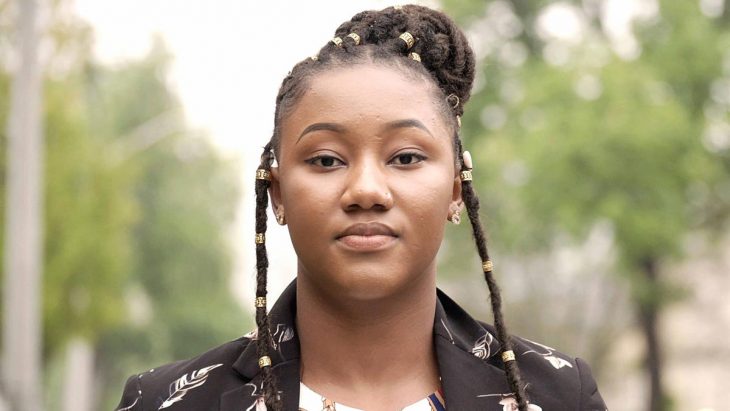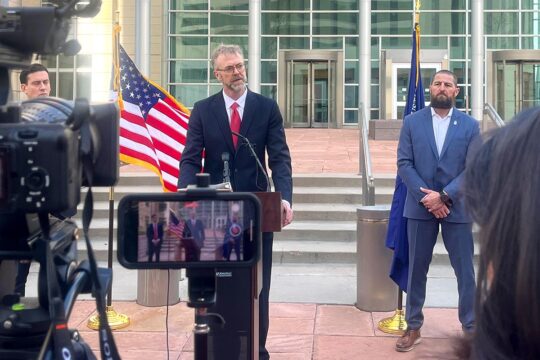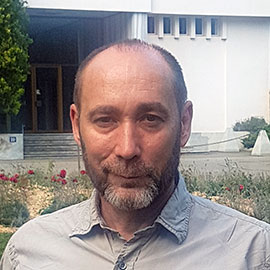It is not the first time that Dakar, the capital of Senegal, has been the scene of shocking revelations about the behaviour of former African dictators. In 2015, during the trial of former Chadian President Hissène Habré, Chadian women publicly testified there about organized sexual violence. One of them claimed to have been raped by Habré, a crime for which he was acquitted on appeal. The US-based NGO Human Rights Watch (HRW) played a key role in mobilizing victims in the Habré case.
On 26 June, it was again in Dakar that HRW and Swiss NGO TRIAL International announced they had collected several testimonies implicating former Gambian president Yahya Jammeh in direct rape and sexual assault committed during his rule from July 1994 to January 2017.
Gifts and offers of funding
Three women accuse the former president. One of them, Fatou Jallow who is better known as “Toufah”, has decided to testify publicly. In 2014, Toufah Jallow, then an 18-year-old drama student, won the main state-sponsored beauty pageant. She received the handsome sum of 50,000 dalasis (about $1,250 in 2015). Shortly afterwards she said she got a call from Jimbee Jammeh, the president’s cousin, asking her to attend an event at State House, she recounts. In her first meeting with Jammeh, together with other contestants, Jammeh “was very jovial, making jokes about tribes,” she said. “He said that the purpose of the competition was to empower us. He told us not to get married right away and become housewives. He said ‘I am going to know about it. I’m not going to be happy about it.’”
That was followed by an official broadcast on state television with Jammeh and several ministers. The women had to present a charitable project for funding. Toufah Jallow’s was a community poverty alleviation project using drama, according to HRW and TRIAL. Toufah Jallow told them that Jimbee Jammeh repeatedly called her to finish up the project, then invited her to State House. “Jimbee [Jammeh] did not tell me that I would meet the president,” Toufah said. Once there, she met Yahya Jammeh privately for the first time, together with Jimbee, and talked comfortably while Jimbee lounged nearby. An hour after, Jimbee “brought a box, with a gold chain inside. She said it was a gift ‘from us. You deserve more, you are really awesome.’”
Pressure and promises
A week later, Jimbee Jammeh visited Toufah at her home on the outskirts of the Gambian capital Banjul. There she handed her the president on the phone, according to the testimony. “Jimbee told me that you don’t have running water in your home…. I’m going to talk to Jimbee to settle that,” the president told her. Soon after, the state company installed running water. Toufah said that Jimbee also bought the family expensive furniture.
The next time, they had dinner in his apartment, and the conversation became more personal. President Jammeh asked her if she had thought of getting married and if she had a boyfriend. “You know I’m the president, I can find out anything,” he told her before giving her another 50,000 dalasis “for the bother of coming and waiting here”. Then he went on the offensive, saying that he wanted to marry her. She said she was too young and not ready. He told her “maybe you are confused right now, but get back to me”.
Toufah reported that the next day, Jimbee took her on a tour of villas, saying that the president was ready to give her a villa and a car. She said that Jimbee told her, “He told you something yesterday and when that becomes possible, that’s yours.” She said Jimbee then changed tone and said, “What is wrong with you? Who gets an opportunity like this?” After that, Toufah blocked Jimbee’s number. But in June 2015 she was informed she should go to the presidency for a religious ceremony marking the beginning of Ramadan. It was there that Toufah Jallow was taken “to a room where [Yahya] Jammeh soon appeared and later locked her in another room”, according to the report of the two human rights organizations.
Slaps, death threats and rape
HRW and TRIAL recount what happened next as follows:
“He told me, ‘No woman has ever rejected me. And who do you think you are?’” Toufah Jallow said. “His face changed, his eyes were so red, different from the man before. He said, ‘No woman rejects me. You think you can get away with it?’” She said he then slapped her, and she fell on a chair: “He yelled at me, ‘This could have been nice, because I loved you but you decided to be this feminist girl to me.’” She said that she screamed, and he slapped her, told her to shut up, and then injected her in her arm with a needle. She said she was reaching for the door when he warned, “If you make any move, I will kill you with my own hands.” He then pulled her dress off, she said, and said “Let’s see if you’re a virgin.” She said he rubbed his genitals in her face and touched them to arouse himself. She screamed that she was dying. “He said, ‘This does not kill, it’s fun.’” Toufah Jallow said he then held her hands down and raped her. She said she lost consciousness and when she woke up, Jammeh said, “Get out of here.”
A few days later, Toufah Jallow fled to Senegal. After meeting with various NGOs and UN agencies she obtained asylum in a third country, where she lives today.
Interview with Fatou Jallow by HRW
Three women have accused Gambia’s former president, Yahya Jammeh, of rape and sexual assault while he was in office. Fatou "Toufah" Jallow is the first survivor to tell her story publicly. (© Human Rights Watch)
“Protocol girls”
HRW and TRIAL also accuse Yahya Jammeh of having personally recruited “protocol girls”, whom he sexually harassed. According to former members of President Jammeh’s entourage and two former “protocol girls”, Jammeh and his assistants “gave the women gifts, cash, and privileges if they had sex with Jammeh”. A former top aide to the president said that Jammeh “handpicked young women to satisfy his sexual fantasies”.
“Anta”, 23 at the time, was one of them. She said that Jammeh spotted her at an event, that government officials put her on the payroll in the protocol department, and Jammeh gave expensive gifts to her indigent parents. She said that she refused when Jammeh first demanded sex, but that he said he “was supporting my family and that he could end it anytime”. On another occasion when he called her in for sex, he told her that she should not talk to anyone about it or she “would face consequences”.
Another “protocol girl,” “Binta,” said that Jammeh offered her a scholarship to study in the United States. When she refused to have sex with him, Jammeh became angry and sent her away. She said Jammeh instructed his chief of protocol to bar her from going for her visa interview at the US Embassy and to terminate her contract at State House. He also rescinded his scholarship offer.
HRW and TRIAL say the three women interviewed who accused Jammeh of rape and sexual assault identified his cousin Jimbee Jammeh as the person overseeing the “protocol girls” and the procurement of other women. The three women said she befriended them, phoned them, had them brought to State House, took them to Jammeh, and stayed with them and the president in his room before leaving them alone.
A system of abuse
Another woman, Fatoumatta Sandeng, says that in 2015 she received a phone call from Jimbee Jammeh who told her: “you are needed by the president tomorrow”. Jimbee insisted that she come alone and not as she had proposed with other members of her music band or her manager. She refused, but then received a call from the chief of protocol who told her it was an “order”. Sandeng was driven to Kanilai. During the following three days, she recounts, Jimbee prevented her from leaving the hotel, while her meeting with Jammeh was postponed. On the fourth day, since Jammeh had to go to a funeral, his cousin gave her 50,000 dalasis and let her go on the promise that she would return. “Looking back, I was so lucky to get away and escape the fate of other women,” she concludes.
Fatoumatta Sandeng is the daughter of renowned Gambian political opponent Solo Sandeng, whose death in detention in 2016 triggered the start of the protest movement that forced Jammeh from power. She is also spokesperson for the “Campaign to Bring Yahya Jammeh and his Accomplices to Justice” (#Jammeh2Justice). This campaign was set up in October 2017 by HRW and its enterprising lawyer Reed Brody, who led the campaign that finally brought Hissène Habré to trial.
Interview with Marion Volkmann, coordinateor of the campaign #Jammeh2Justice in Banjul (in french)
Video released on April 9, 2018 (© JusticeInfo.net)
Jammeh’s sexual exploitation of women was well known to his entourage, says the press release of the NGOs. HRW and TRIAL have gathered testimonies from five former officials who said that he ordered them and others to get the phone numbers of women he identified. They said they later saw some of these the women leaving Jammeh’s house with money. Officials working with Jammeh said that he “also had sex with women soldiers assigned to his close protection and other civil servants working under him”. HRW and TRIAL say they interviewed eight former Gambian officials -- four close protection officers for Jammeh, a former National Intelligence Agency senior official and two men who worked for the Protocol Department at State House (the presidential palace) – as well as several other witnesses. All requested anonymity.
Now up to the Truth Commission
With this report, the two NGOs are keeping up the pressure in their campaign to obtain the extradition of the former president, who has been in exile in Equatorial Guinea since he lost the 2016 election and was forced to leave the country. According to the NGOs, Jimbee Jammeh is also in Equatorial Guinea.
The publication of this report is ahead of the timetable set by the Truth, Reconciliation and Reparations Commission (TRRC), which has been holding hearings in The Gambia since 7 January and follows both a chronological and a thematic strategy. In their statement, the NGOs called on the TRRC to take up these charges and recommended that the perpetrators be brought to justice. In an interview with Justice Info, Reed Brody said it was not a question of putting pressure on the Commission. "So far, we have no reason to doubt the TRRC's determination to investigate this issue," he says.
"It would have been better if they had waited," says Essa Faal, the TRRC's senior counsel, who is in charge of scheduling hearings. The story of Yahya Jammeh's alleged sexual abuse will undoubtedly become even more public in a few months, when these victims, or others, are called to testify before the TRRC.







